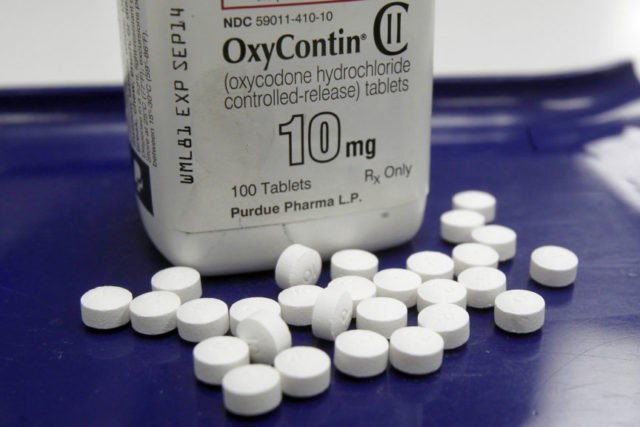Texas Attorney General Ken Paxton announced Tuesday his office is suing Purdue Pharma, maker of the opioid OxyContin, for violating the Texas Deceptive Trade Practices Act.
The civil action, filed in Travis County, alleged that the Connecticut-based pharmaceutical giant sold the “highly addictive” opioids through “aggressive and deceptive marketing efforts” by misleading doctors and consumers into believing these narcotics had a low risk of addiction and that they successfully treated long term pain.
“Purdue used false and deceptive practices to promote these products through a sophisticated marketing scheme aimed at consumers and healthcare providers alike,” stated Paxton during Tuesday’s press conference. “In the face of abundant evidence showing that the drug was dangerous and that long-term use could lead to addiction, Purdue saw fit to exchange destroyed lives for financial gain.”
According to the lawsuit, Purdue “realized over $35 billion in sales from OxyContin since it began marketing the drug in 1996.” It pointed out that, in 2015, Purdue’s owners, the Sackler family, landed on Forbes’ “Richest U.S. Families” list. Meanwhile, the petition alleged that from 1999 to 2015, Texas experienced a 3.5-fold increase in the state’s number of opioid related deaths.
“As Purdue got rich from sales of its opioids, Texans and others across the nation were swept up in a public health crisis that lead to tens of thousands of deaths each year due to opioid overdoses,” stated Paxton.
The National Institutes of Health cited 1,375 opioid-related overdose deaths in Texas during 2016, up from 1,186 in 2015. The U.S. Centers for Disease Control and Prevention (CDC) estimated more than 42,000 drug overdose deaths occurred in 2016 and they involved an opioid. In 2015, the CDC accounted for more than 33,000 opioid-related U.S. deaths.
Paxton underscored that of the top 25 cities for opioid abuse, four are in Texas – Texarkana, Amarillo, Odessa, and Longview. Additionally, a 2016 Texas Department of State Health Services report by the Maternal Mortality and Morbidity Task Force identified “overdose by licit or illicit prescription drugs” as a leading cause of maternal deaths in the state.
The lawsuit seeks significant civil penalties, including specified monetary relief from Purdue for its purportedly illegal conduct and a permanent injunction to prevent future harm to Texans.
Last year, Paxton joined 40 other state attorneys general in serving investigative subpoenas to eight pharmaceutical companies that manufactured or distributed these highly addictive pain killers.
During the press conference, Paxton called the consumer protection lawsuit the “next step.”
Texas was one of six states that announced similar lawsuits against Purdue this week. The other states are Florida, Nevada, North Carolina, North Dakota, and Tennessee.
In response, Purdue “vigorously” denied the accusations in a statement, saying the company’s drugs were approved by the U.S. Food and Drug Administration and accounted for only two percent of all opioid prescriptions.
“We are disappointed that after months of good faith negotiations working toward a meaningful resolution to address the opioid crisis, this group of attorneys general have unilaterally decided to pursue a costly and protracted litigation process,” said Purdue spokesman Robert Josephson.
In October, Purdue was one of more than 12 Big Pharma defendants sued in a federal lawsuit filed by Upshur County in East Texas. Breitbart Texas reported that this complaint also alleged these pharmaceutical companies engaged in deceptive marketing practices to encourage doctors to prescribe opioids for chronic pain sufferers while deemphasizing the addictive properties and potentially dangerous consequences of these powerful narcotics.
Since 1999, the number of prescription opioids like OxyContin (oxycodone), Vicodin (hydrocodone), morphine, and methadone dispensed nationwide almost quadrupled. Heroin is an illegal opioid. Tramadol and fentanyl are synthetic opioids. Last year, the U.S. Drug Enforcement Administration (DEAP) described fentanyl as “50 times more potent than heroin, is extremely dangerous to law enforcement and anyone else who may come into contact with it.”
Follow Merrill Hope, a member of the original Breitbart Texas team, on Twitter.

COMMENTS
Please let us know if you're having issues with commenting.